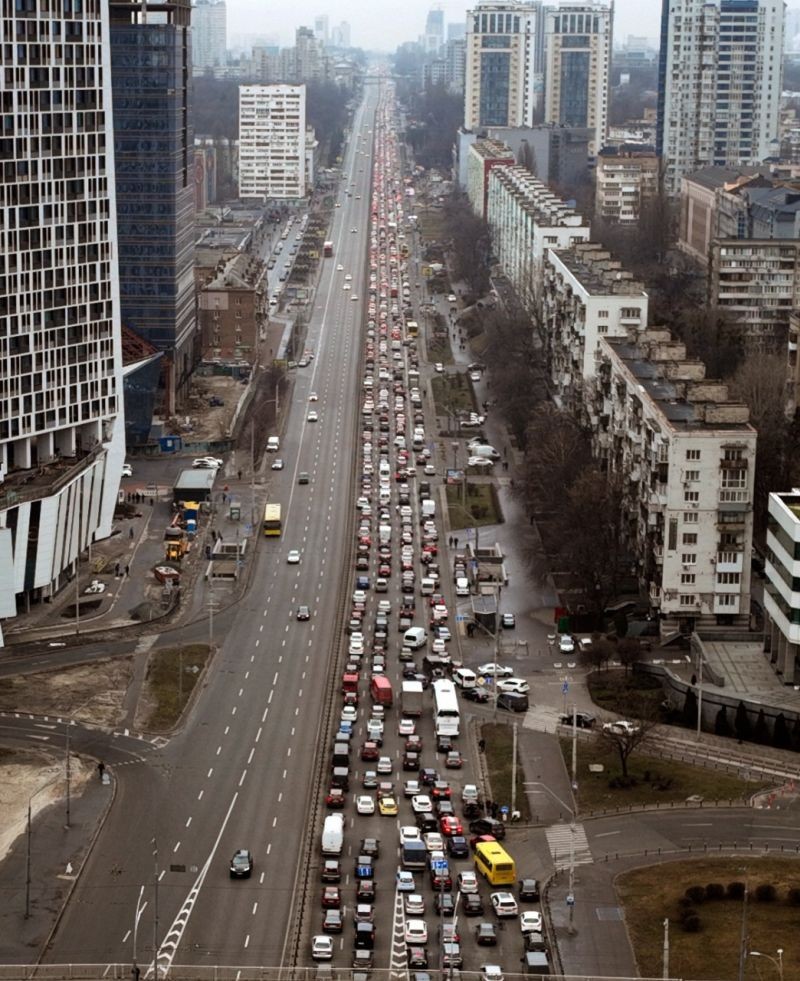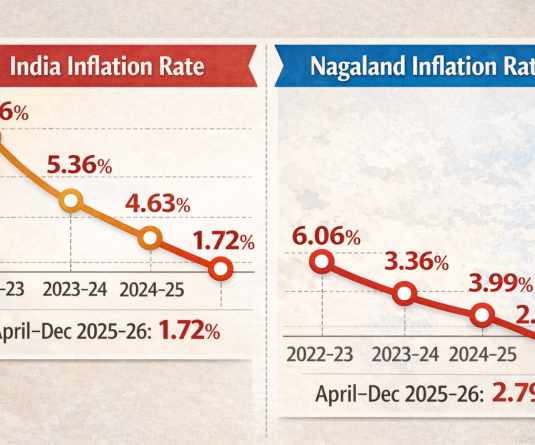Traffic jams are seen as people leave the city of Kyiv, Ukraine on February 24. Russian President Vladimir Putin on Thursday announced a military operation in Ukraine and warned other countries that any attempt to interfere with the Russian action would lead to consequences you have never seen. (AP/PTI Photo)

Moa Jamir
Morung Express Feature
From SWIFT Code to oligarchs, from the Soviet Union to NATO, some key terms have been used repetitively in the wall-to-wall coverage of the Russian attack on Ukraine starting February 25 on various media platforms.
A "special military operation,” to Russian President Vladimir Putin and a full-scale invasion to others, the attacks came after weeks of intense diplomacy as well as threat and impositions of sanctions by Western countries, particularly the United States, European Union and The United Kingdom.
As the chain of events unfolds, among others, into a rapid humanitarian crisis as well as a ‘war of rhetoric,’ The Morung Express presents a lowdown on some of the key terms related to the Russia-Ukraine crisis.
Sanctions
Article 41 of the Charter of the United Nations gives the Security Council the authority to impose sanctions measures encompassing a broad range of enforcement options that do not involve the use of armed force.
The Council have imposed sanctions of different forms on various occasions, in pursuit of a variety of goals including comprehensive economic and trade sanctions to more targeted measures such as arms embargoes, travel bans, and financial or commodity restrictions, as per the UN.
Likewise, Governments and multinational bodies impose economic sanctions to try to alter the strategic decisions of state and non-state actors that threaten their interests or violate international norms of behaviour, goes an explanation by the New York-based think tank Council on Foreign Relations (CFR).
Sanctions have been used to advance a range of foreign policy goals, including counterterrorism, counternarcotics, nonproliferation, democracy and human rights promotion, conflict resolution, and cyber security, it said.
However, the concept of economic sanctions, understood as the restrictions of economic activities including trade, financial services and movement of goods, services as well as people, are increasingly used in practice.
By doing so, sanctions suspend normal interactions in specific areas and are imposed either as deterrence or ‘punishing’ on a targeted state or non-state actors. Export sanctions, import sanctions and financial sanctions are some of the most popular instruments used to achieve this purpose.
In the current crisis, Russia’s action on Ukraine has resulted in various ‘sanctions’ against the former. However, the measures so far are seen as not enough deterrence and there are calls for more and tougher sanctions.
Swift Code
The Society for Worldwide Interbank Financial Telecommunication (SWIFT) codes, which facilitate international money transfers securely and is a “global member-owned cooperative and the world’s leading provider of secure financial messaging services.”
For such transfers, all banks and financial institutions are assigned an 8 or 11-character, SWIFT code or BIC (Business Identifier code), an international standard for routing business transactions and identifying business parties.
Accordingly, if a person/business wants to send or received money to/from abroad, the recipient needs a SWIFT code of the particular bank or financial institution.
As per its website, in 1973, 239 banks from “15 countries got together to solve a common problem: how to communicate about cross-border payments” and formed the cooperative utility, the SWIFT, headquartered in Belgium.
The SWIFT went live with its messaging services in 1977, replacing the Telex technology that was then in widespread use. SWIFT is now a global financial infrastructure that spans every continent, 200+ countries and territories, and services more than 11,000 institutions around the world, as per the information available on its website.
It is akin to the unique 11-digit alphanumeric Indian Financial System Code (IFSC) used assigned by the Reserve Bank of India to each bank and used for monetary transactions across India.
Increasingly, there is a demand from various quarters to remove Russia from the SWIFT network as a part of the sanctions for the attack in Ukraine. Among others, the removal from the SWIFT network could tighten the noose on Moscow financially and affects its global trade.
Oligarch
The Oxford Learner’s Dictionaries defined oligarchy as “a form of government in which only a small group of people hold all the power” or “people who hold power in an oligarchy” or a “country governed by an oligarchy.” By extension, an oligarch is a member of an oligarchy.
Additionally, the OED described an oligarch as “an extremely rich and powerful person, especially a Russian who became rich in business after the end of the former Soviet Union.”
Aftermath the Russian attacks, there have been particularly insistent demands for sanctions on rich Russian oligarchs, considered close to Putin.
Security Council and Veto
Out of six main organs of the UN established under the United Nations Charter, the Security Council is considered to be most powerful, and is primarily responsible for “maintaining international peace and security to the Security Council, which may meet whenever peace is threatened.”
The Security Council consists of ten non-permanent members, elected on a rotational basis by geographic region for two years by the United Nations General Assembly, and five permanent members - China, the United States, France, the United Kingdom, and the Russian Federation.
According to the Charter, all “members of the United Nations agree to accept and carry out the decisions of the Security Council,“ while other organs of the UN make recommendations to member states, only the Council has the power to make decisions that member states are then ‘obligated to implement under the Charter.’
Veto simply means “an official power or right to refuse to accept or allow something.” The five permanent members of the UN Security Council care conferred with veto power, effectively giving them rights to reject or stop the adoption of a proposal or resolution in the Council.
On February 25, Russia vetoed a UN Security Council resolution that “deplores in the strongest terms” its “aggression” against Ukraine and demanded the immediate withdrawal of its troops.
NATO
The North Atlantic Treaty Organisation (NATO) was created in 1949 by the United States, Canada, and several Western European nations to provide collective security against the erstwhile Soviet Union, aftermath the World War II.
As per the US Department of State, NATO was the first peacetime military alliance the United States entered into outside of the Western Hemisphere.
The primary purpose of NATO is to “guarantee the freedom and security of its members through political and military means,” stated the organisation’s website.
According to NATO, while it is committed to the peaceful resolution of disputes if diplomatic efforts fail, it has the “military power to undertake crisis-management operations.”
These operations are carried out under the “collective defence clause of NATO's founding treaty - Article 5 of the Washington Treaty or under a United Nations mandate, alone or in cooperation with other countries and international organisations.”
Article 5 states that “an attack against one or several of its members is considered as an attack against all” and so far been invoked once - in response to the 9/11 terrorist attacks in the United States in 2001.
In the current Russia-Ukraine crisis, one of the demands of Putin is a halt to the eastward enlargement of NATO, which he argued undermines Russia’s security.
During the Soviet Union regime, as a counterweight to NATO, the Warsaw Pact was signed between the Soviet Union and other Eastern Bloc socialist republics of Central and Eastern Europe in 1955. But with the disintegration of the USSR, the Pact was declared disbanded in 1991.
Now, most of the former Pacts’ members such as Albania, Bulgaria, Czech Republic, Hungary, Poland and Romania are part of NATO, while some countries gaining independence after the collapse of the Soviet Union such as Estonia, Latvia and Lithuania had joined the Alliance, much to Russia’s discomfiture.
Cold War and Power Blocs
In international relations, the Cold War is a concept used to describe a “state of hostility” between nations without resorting to actual military conflict.
The term gained prominence after World War II, when the global geopolitical balance of power veered into the battle of supremacy between two dominating Blocs – the Western and Eastern Blocs, the former headed by the US and the latter by the erstwhile Soviet Union or officially the Union of Soviet Socialist Republics (USSR).
The bi-polar world led by two competing superpowers often resulted in the battle of ideologies – say Capitalism vs. Socialism, arms race, economic and political competitions, cultural influences and indirect engagement in armed conflict using proxies etc, often far away from the epicentre.
The Korean War, Vietnam War, Cuban Missiles Crisis, and Soviet War in Afghanistan are some of the significant Cold War confrontations between the two superpowers, without full-scale direct conflicts between them. Both sides reportedly have funded revolutions, effected changes of governments and played other political games, particularly in Central America, Africa, Asia, and the Middle East.
Putin’s recent actions are seen as harking back to the bygone Cold War era, resetting the global balance of power and challenging the US’ unilateralism.
Baltic States
The Baltic States refer collectively to three countries Estonia, Latvia, and Lithuania, located on the eastern shores of the Baltic Sea in the northeastern region of Europe and bordering Russia.
As per the European Commission, the Baltic States share common features and a similar history, and regained their independence from the Soviet Union in the early nineties before joining the EU in 2004 and more recently, the Euro Area i.e. Member States of the EU that have adopted the Euro as their currency.
The three countries, bordering Russia, also joined NATO in 2004, generating strong reactions in Moscow.
Soviet Union
Soviet Union, officially the Soviet Socialist Republics (USSR), was established in the post-revolutionary Russia (1917–1991) stretching from the Baltic and Black seas to the Pacific Ocean. According to Encyclopedia Britannica, in its final years, the USSR consists of 15 Soviet Socialist Republics (SSRs): Armenia, Azerbaijan, Belorussia (now Belarus), Estonia, Georgia, Kazakhstan, Kirgiziya (now Kyrgyzstan), Latvia, Lithuania, Moldavia (now Moldova), Russia, Tajikistan, Turkmenistan, Ukraine, and Uzbekistan. The capital was Moscow, then and now the capital of Russia.
As the global balance of power oscillated between the two power Blocs after the Second World war, the Soviet Union’s influences spread over its satellite states such as East Germany, Poland, Czechoslovakia, Hungary, Romania, Bulgaria, and beyond Europe in countries like Mongolia, Vietnam, Korea China, Cuba and in other Latin American countries from time to time.
As per the Britannica, the USSR is prominent for following the concept of ‘Iron Curtain’ - the political, military, and ideological barrier to seal off itself and its dependent eastern and central European allies from open contact with the West and other non-communist areas.
However, when Mikhail Gorbachev assumed charge of the Soviet Union in the early 1980s, he enacted two reforms known as Glasnost and Perestroika literally, ‘openness’ and ‘reconstruction’ respectively.
As per an explanation by the Centre for European Studies, the University Of North Carolina, the Anti-Soviet dissenters and nationalist parties in the republics seized this opportunity to protest and gather support for their independence movements and succeeded.
In 1990, the Communist Party voted to end one-party rule and the newly created legislative body, the Russian Soviet Federated Socialist Republic voted to officially leave the Communist Party of the Soviet Union (CPSU) and declared Russian sovereignty.
In a final attempt at keeping the Soviet Union together, CPSU hardliners staged a coup in August 1991 but failed. Russia replaced the Soviet Union at the United Nations and took over its seat on the Security Council. Boris Yeltsin who succeeded Gorbachev eliminated the CPSU, and officially dissolved the Soviet Union on December 24, 1991.
On February 25, US President Joe Biden accused Russian President Putin of seeking to restore the former Soviet Union, while others postulated that his ambition goes beyond, to erstwhile Russian Empire and Tsardom.
European Union
The European Union is the result of an economic and political partnership between European countries, with its origin in 1951 with the coming together of ‘inner six’ nations - Germany, France, Italy, the Netherlands, Belgium and Luxembourg - for European Coal and Steel Community (1951), for a treaty to run their coal and steel industries under common management based on the Schuman plan.
Building on its success, they expand their cooperation to other economic sectors by signing the Treaties of Rome on March 25, 1957 – creating the European Economic Community (EEC), and the European Atomic Energy Community (Euratom).
Gradually, most of the Western European countries joined European Communities, as it transformed into a Common Market and officially become European Union in 1994 via the Treaty on European Union or Treaty of Maastricht “to promote peace, its values and the well-being of its peoples.” With the collapse of the Soviet Union in the early 1990s, the EU undertook its eastern enlargement, enabling political and economic integration of more countries into the union.
Presently, the EU is considered a unique (sui generis) supranational organisation, having a common market, parliament, bank etc as well as a single currency (EURO) and visa regime (Schengen) in most of the 27 member states, though its military and foreign policy are inter-governmental. One prominent member, the United Kingdom, exited from the union in 2021.
Politically, the EU and Russia have shared an uneasy relationship, though economically there are well-entrenched with each other. As the EU penetrates more deeply into Eastern Europe, it comes into conflict with Russia's strategic interests as the country’s political and economic influence over former Soviet states are deemed to be reduced.





